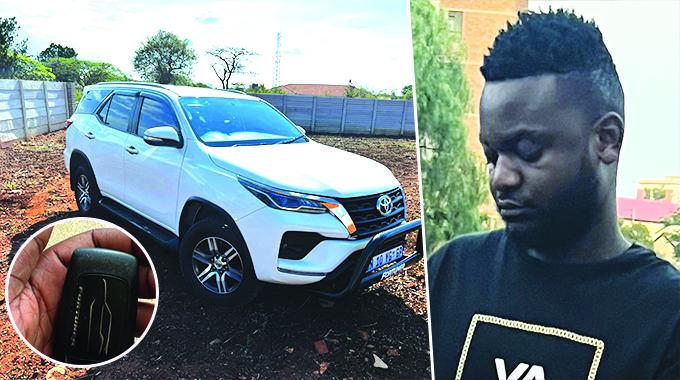News / Local
Bulawayo socialite awaits bail ruling amid stolen vehicle scandal
26 Nov 2024 at 18:01hrs | Views

Bulawayo car dealer and socialite Brighton Chipunza, popularly known as "Dash," is set to hear the ruling on his bail application tomorrow. The 30-year-old faces charges connected to the theft of a South African-registered Toyota Fortuner, a case that has drawn widespread attention due to dramatic developments both inside and outside the courtroom.
Chipunza, arrested on November 17, is accused of orchestrating the theft of the vehicle from a car wash in Bulawayo's central business district. Tensions surrounding the case escalated after reports that Chipunza threatened the complainant outside the courtroom and insulted both the complainant and journalists with offensive gestures.
The bail application, to be ruled on by Bulawayo regional magistrate Mrs. Benhilda Chiundura, is being opposed by prosecutor Mr. Dominic Moyo. The state argues that Chipunza poses a flight risk, citing his alleged involvement in other pending cases.
Stolen Vehicle Recovered in Harare
The stolen vehicle, owned by Ms. Silibaziso Ncube, was traced to a property in Harare using a GPS tracking system provided by a South African company. The discovery led to the arrest of Julius Chitunhu, who was found in possession of the car. Tools including grinders, stencils, acid, and spray paint - believed to have been used to tamper with the vehicle's identification details - were recovered at the scene.
Chitunhu, who has implicated Chipunza, has been remanded out of custody on bail pending trial.
Details of the Theft
According to the state, Ms. Ncube sent her employee to a car wash where the vehicle was cleaned and parked outside under a tree. Later that evening, Ms. Ncube found the car missing, prompting an investigation. Staff at the car wash revealed that CCTV cameras had been deactivated, and the car keys, left unsecured, had been stolen.
Witness accounts suggest the vehicle was taken without suspicion, as employees assumed it was being driven by Ms. Ncube herself.
Alleged Crime Network
Electronic evidence, including WhatsApp messages between Chipunza and Chitunhu, has placed the socialite at the center of the case. This evidence has raised suspicions of a larger car theft syndicate operating in the region.
Chipunza's legal troubles are not new. He was previously implicated in selling a stolen Ford Ranger King Cab in a fraudulent deal and was linked to another vehicle theft outside a prominent leisure establishment in December last year.
Community Reactions
The arrest of Chipunza, known for his charm and high-profile social connections, has shocked the community. Many residents are questioning how individuals with seemingly respectable public personas may be involved in organized crime.
Broader Implications
The case highlights the growing problem of vehicle theft in Zimbabwe, with an uptick in reported cases in recent months. While GPS tracking technology has been instrumental in recovering stolen vehicles, it also underscores the sophisticated methods employed by criminal networks.
Chipunza's case, set against the backdrop of Bulawayo's social and economic landscape, raises broader concerns about youth involvement in organized crime and the need for greater vigilance in safeguarding personal property.
Chipunza, arrested on November 17, is accused of orchestrating the theft of the vehicle from a car wash in Bulawayo's central business district. Tensions surrounding the case escalated after reports that Chipunza threatened the complainant outside the courtroom and insulted both the complainant and journalists with offensive gestures.
The bail application, to be ruled on by Bulawayo regional magistrate Mrs. Benhilda Chiundura, is being opposed by prosecutor Mr. Dominic Moyo. The state argues that Chipunza poses a flight risk, citing his alleged involvement in other pending cases.
Stolen Vehicle Recovered in Harare
The stolen vehicle, owned by Ms. Silibaziso Ncube, was traced to a property in Harare using a GPS tracking system provided by a South African company. The discovery led to the arrest of Julius Chitunhu, who was found in possession of the car. Tools including grinders, stencils, acid, and spray paint - believed to have been used to tamper with the vehicle's identification details - were recovered at the scene.
Chitunhu, who has implicated Chipunza, has been remanded out of custody on bail pending trial.
Details of the Theft
According to the state, Ms. Ncube sent her employee to a car wash where the vehicle was cleaned and parked outside under a tree. Later that evening, Ms. Ncube found the car missing, prompting an investigation. Staff at the car wash revealed that CCTV cameras had been deactivated, and the car keys, left unsecured, had been stolen.
Witness accounts suggest the vehicle was taken without suspicion, as employees assumed it was being driven by Ms. Ncube herself.
Alleged Crime Network
Electronic evidence, including WhatsApp messages between Chipunza and Chitunhu, has placed the socialite at the center of the case. This evidence has raised suspicions of a larger car theft syndicate operating in the region.
Chipunza's legal troubles are not new. He was previously implicated in selling a stolen Ford Ranger King Cab in a fraudulent deal and was linked to another vehicle theft outside a prominent leisure establishment in December last year.
Community Reactions
The arrest of Chipunza, known for his charm and high-profile social connections, has shocked the community. Many residents are questioning how individuals with seemingly respectable public personas may be involved in organized crime.
Broader Implications
The case highlights the growing problem of vehicle theft in Zimbabwe, with an uptick in reported cases in recent months. While GPS tracking technology has been instrumental in recovering stolen vehicles, it also underscores the sophisticated methods employed by criminal networks.
Chipunza's case, set against the backdrop of Bulawayo's social and economic landscape, raises broader concerns about youth involvement in organized crime and the need for greater vigilance in safeguarding personal property.
Source - The Chronicle















































